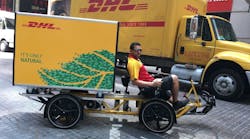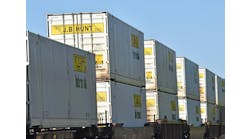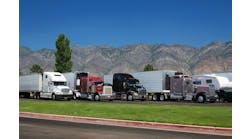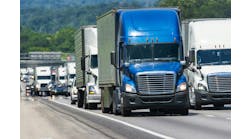DHL, earlier this month, announced it is rolling out its Cubicycle in New York City, participating in a pilot program to test the use of cargo bikes to alleviate traffic congestion as well as lessen air and noise pollution in the city’s crowded streets.
The pilot program encourages all freight companies to use cargo bikes on city streets during an initial six-month trial period. The initial participants are DHL, Amazon and UPS and as many as 100 bikes will be deployed in Manhattan’s Central Business District south of 60th Street. The City’s Department of Transportation will collect information about speed, parking, use of bike lanes and the size of the bikes to determine if they are an efficient option to help relieve traffic congestion.
”Cargo bicycles will play an important role in hitting our environmental targets,” said Mike Parra, DHL Express Americas CEO. The company’s goals include achieving net zero emissions from transport activities by 2050 and performing at least 70% of pick-ups and deliveries with green energy solutions such as electric vehicles and bikes by 2025.
“The DHL Cubicycle has enjoyed great success in Europe, with each bicycle deployed taking at least one conventional delivery van off the road, helping to relieve congestion and increasing our service levels,” said Parra.
The New York Department of Transportation is in full support of this program. “With trucks involved in a disproportionately high number of cyclist fatalities in New York City this year, we are especially interested in the safety benefits this pilot can bring to our streets,” said NYC DOT Commissioner Polly Trottenberg
The Cubicycle has several features that make it attractive for delivery operations in heavy traffic areas: a reclining seat that provides greater comfort, safety and speed for the courier; electric pedal assistance for additional speed and support in climbing hills and making it easier to handle within a tight turning radius. The removable containers are secure, waterproof and offer large capacity for packages but are low enough to the ground so as to not impair the view of other cyclists on the road. They can be equipped with GPS transmitters to facilitate real-time shipment tracking and monitoring for security purposes. The bikes are also self-powered through the use of solar panels.
By replacing a conventional delivery vehicle, each deployed Cubicycle is expected to reduce carbon emissions by up to eight metric tons per year. The bikes reduce the use of energy by up to 90% compared to electric vans and even more when compared to vehicles with internal combustion engines.
DHL has been an early adopter of using bikes as an alternative delivery option in crowded city centers. First introduced in 2015 in the Netherlands, the Cubicycle now is being used in Germany, Belgium, Hong Kong and Singapore. DHL has about 85 cargo bikes in its ground fleet globally, including Cubicycles and a smaller Parcycle, a two-wheel bike with a cargo box. This pilot program will be the first use of the Cubicycle in the U.S.
In the U.S., DHL maintains an alternative fuel vehicle (AFV) fleet, which includes fully electric, hybrid-electric, compressed natural gas (CNG) and clean diesel. In 2011, the company put in place an all-green fleet in Manhattan fully comprised of electric and hybrid vans. Earlier this year, it announced that it was adding 63 NGEN-1000 electric delivery cargo vans that would be rolled out in the San Francisco Bay area and Long Island City, N.Y.



